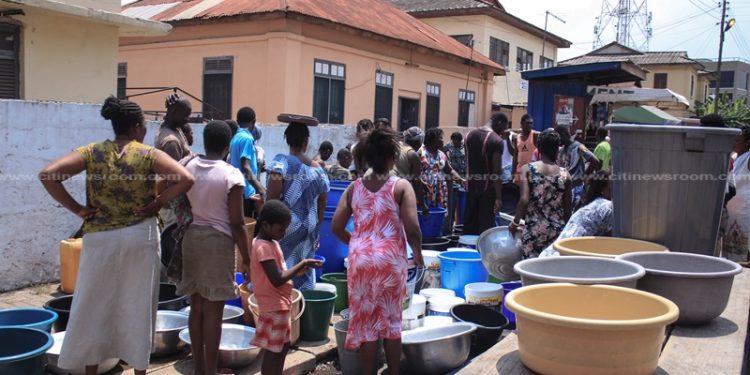1 in 5 Ghanaians lack easy access to drinking water – GSS
The Statistical Service produces monthly and quarterly data on important economic indicators such as inflation, Consumer Price Index, Producer Price Index, and Gross Domestic Product. GSS also regularly generates periodic population, housing, demographic and economic data at the locality, district, and national levels from routine surveys and censuses.
The Ghana Statistical Service (GSS) has indicated that findings from the 2022 Ghana Demographic and Health Survey (GDHS) indicate that one in every five (19.1%) persons in Ghana did not have enough drinking water in the month preceding the survey.
In the Northern Region, which recorded the highest percentage, one in every three (32.1%) persons did not have adequate drinking water. Oti (31.2%) and North East (26.2%) were the regions with the next highest percentage that did not have enough drinking water.
The Upper East (14.0%) and Ashanti (14.5%) regions recorded the lowest percentage of persons without drinking water in sufficient quantities, with figures less than half those of the Northern and Oti regions.
The GSS made this known in a statement sighted by Citi News on Friday.
It was also to mark this year’s World Water Day which is commemorated annually on 22nd March. The theme for 2024 is ‘Water for Peace’.
The Service noted that nationally, 6.5 per cent of the population travelled more than 30 minutes round-trip to obtain drinking water.
“More than a quarter (27.5%) of the population in the North East Region reported travelling more than 30 minutes to access water, the highest recorded, followed by the Northern (18.6%) and Upper West (18.6%) regions.
“Three in every five (59.9%) persons in Ghana did not have water on their premises. Nine in every ten persons (89.8%) in the Savannah Region did not have water on their premises, the highest recorded and 1.5 times higher than the national average. North East (86.5%) and Oti (83.5%) regions have the second and third highest percent of the population without water on their premises.”
“Greater Accra (22.0%) recorded the lowest percentage of the population without water on the premises. Volta Region (47.1%) is the only other region where less than half of the population does not have water on the premises. More than 90.0 percent of the population in the lowest wealth quintile (93.6%) were without drinking water on their premises, more the five times the percentage recorded for those in the highest wealth quintile (17.5%),” it stated.
The GSS stated that nationally, 83.8 percent of the population had at least basic drinking water service, defined as an improved water source with either water on the premises or a round-trip collection time of 30 minutes or less.
“The percentage is lowest in the North East Region (43.4%) where less than half of the population has access to basic water services. Savannah (54.2%), Oti (57.8%), and Northern (64.4%) regions have the next highest percentage of the population with access to basic water services.
Greater Accra (97.7%) and Ashanti (94.8%) were the regions with the highest percentage who have access to basic services, recording figures that are more than twice that of the North East Region.”
“Persons in the poorest wealth quintile have the lowest percentage with at least basic water services (52.1%), almost half the percentage for persons in the highest wealth quintile (97.9%). Eight in every 10 (82.3%) of persons using unimproved water sources did not treat their water. Unimproved water sources refer to unprotected dug wells or unprotected springs,” it stated.
The Service underscored that eight in every 10 (84.3%) persons using surface water (i.e., drinking water directly from a river, dam, lake, pond, stream, canal, or irrigation canal) did not treat their water.
The 2022 Ghana Demographic and Health Survey report, resources, and microdata are available to download at no cost from www.statsghana.gov.gh.
About the Ghana Statistical Service
The Ghana Statistical Service (GSS) provides comprehensive, reliable, quality, relevant, accurate, and timely statistical information to guide national development as stipulated in Section 3 of the Statistical Service Act, 2019 (Act 1003).
The organisation’s vision is to be a trusted provider of official statistics for good governance and its mission being the efficient collection, production, management, and dissemination of quality official statistics based on international standards, using competent and motivated staff for evidence-based decision-making, in support of national development.
The Statistical Service produces monthly and quarterly data on important economic indicators such as inflation, Consumer Price Index, Producer Price Index, and Gross Domestic Product. GSS also regularly generates periodic population, housing, demographic and economic data at the locality, district, and national levels from routine surveys and censuses. The statistics generated by GSS can be utilised by a wide cross-section of users including public sector, businesses, academia, civil society organisations and development partners. For more information visit www.statsghana.gov.gh
Source:citinewroom


